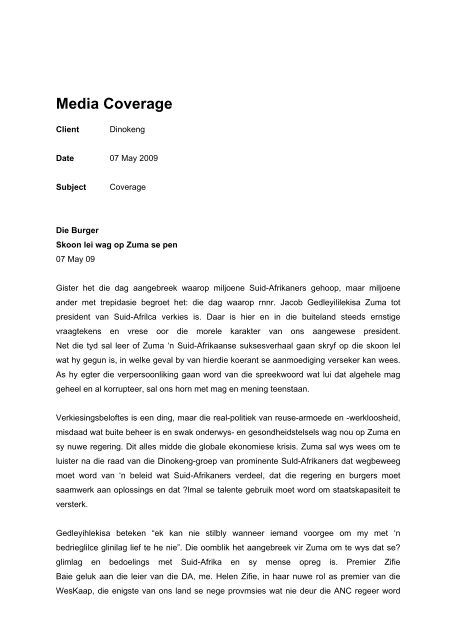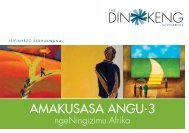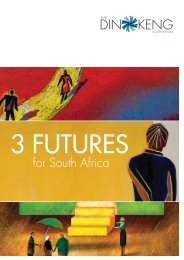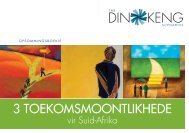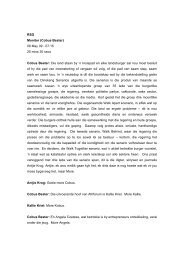Media Coverage - Dinokeng Scenarios
Media Coverage - Dinokeng Scenarios
Media Coverage - Dinokeng Scenarios
Create successful ePaper yourself
Turn your PDF publications into a flip-book with our unique Google optimized e-Paper software.
<strong>Media</strong> <strong>Coverage</strong><br />
Client<br />
<strong>Dinokeng</strong><br />
Date 07 May 2009<br />
Subject<br />
<strong>Coverage</strong><br />
Die Burger<br />
Skoon lei wag op Zuma se pen<br />
07 May 09<br />
Gister het die dag aangebreek waarop miljoene Suid-Afrikaners gehoop, maar miljoene<br />
ander met trepidasie begroet het: die dag waarop rnnr. Jacob Gedleyililekisa Zuma tot<br />
president van Suid-Afrilca verkies is. Daar is hier en in die buiteland steeds ernstige<br />
vraagtekens en vrese oor die morele karakter van ons aangewese president.<br />
Net die tyd sal leer of Zuma ‘n Suid-Afrikaanse suksesverhaal gaan skryf op die skoon lel<br />
wat hy gegun is, in welke geval by van hierdie koerant se aanmoediging verseker kan wees.<br />
As hy egter die verpersoonliking gaan word van die spreekwoord wat lui dat algehele mag<br />
geheel en al korrupteer, sal ons horn met mag en mening teenstaan.<br />
Verkiesingsbeloftes is een ding, maar die real-politiek van reuse-armoede en -werkloosheid,<br />
misdaad wat buite beheer is en swak onderwys- en gesondheidstelsels wag nou op Zuma en<br />
sy nuwe regering. Dit alles midde die globale ekonomiese krisis. Zuma sal wys wees om te<br />
luister na die raad van die <strong>Dinokeng</strong>-groep van prominente Suld-Afrikaners dat wegbeweeg<br />
moet word van ‘n beleid wat Suid-Afrikaners verdeel, dat die regering en burgers moet<br />
saamwerk aan oplossings en dat ?lmal se talente gebruik moet word om staatskapasiteit te<br />
versterk.<br />
Gedleyihlekisa beteken “ek kan nie stilbly wanneer iemand voorgee om my met ‘n<br />
bedrieglilce glinilag lief te he nie”. Die oomblik het aangebreek vir Zuma om te wys dat se?<br />
glimlag en bedoelings met Suid-Afrika en sy mense opreg is. Premier Zifie<br />
Baie geluk aan die leier van die DA, me. Helen Zifie, in haar nuwe rol as premier van die<br />
WesKaap, die enigste van ons land se nege provmsies wat nie deur die ANC regeer word
nie. Dit plaas uiteraard ‘n groot verpligtmg op die DA met Zille aan die stuur om te voldoen<br />
aan die hoe verwagtinge wat geskep is en op provinsiale viak die uitmuntende werk wat sy<br />
as burgemeester van Kaapstad gedoen het, voort te sit.<br />
Dit beteken onder meer dat eie- of partybelang agterwe? gelaat word en die provinsie in die<br />
beste belang van al die mense regeer word. Dit is inderdaad ook wat Zifie in haar heel eerste<br />
toespraak as premier ges? het. Maar daar rus ‘n belangrike verpligting op die ANC om ook<br />
die belange van die provinsie en sy mense eerste te stel. ‘n Mens kan aanvaar dat die party<br />
teleurgesteld is omdat hy beheer oor die provinsie verloor het. Die opposisierol in regering is<br />
egter van kardinale belang om te verseker dat wigte en teenwigte ingebou is en om te waak<br />
teen magsmisbruik deur die regerende party. Oe die ANC as die amptelike opposisie in die<br />
provinsiale parlement rus daar dus ‘n besondere veran?woordeliltheid - en een wat nie<br />
ligtelik opgeneem moet word nie - om die rol behoorlik te vervul.<br />
Business Day<br />
State to study three scenarios<br />
SAPA<br />
07 May 09<br />
PATHS I The government would study the <strong>Dinokeng</strong> <strong>Scenarios</strong> mapping out three possible<br />
paths for SA, government spokesman Themba Maseko said yesterday. The <strong>Dinokeng</strong> team<br />
is a group of 35 South Africans from different sectors of society, including businesswoman<br />
Mamphela Ramphele, author Antjie Krog, Democratic Alliance CE Ryan Coetzee, The Elders<br />
member Graca Machel, businessman Vincent Maphai, former City Press editor Mathath<br />
Tsedu and AfriForum’s Kallie Kriel.<br />
Business Day<br />
Elite dictate a solution<br />
07 May 09<br />
SIR | The much-publicised <strong>Dinokeng</strong> <strong>Scenarios</strong> are nothing but an effort by big business to<br />
manufacture a selfserving solution, Of course, they have been published at a strategic<br />
moment when the country is paused for the new president and his team to announce their<br />
own vision and plans. How do the <strong>Dinokeng</strong> <strong>Scenarios</strong> differ from the government’s own<br />
2
Scenario 2024: the future we chose? And why was it necessary to duplicate the<br />
government’s scenario planning at the cost of millions of rands?<br />
There is nothing wrong with more voices adding to the scenario mapping of what this country<br />
ought to be. But the government has long extended its arm to big business, intellectuals and<br />
whites to forge partnerships to work together. Unfortunately, there is a tendency for this<br />
profit-driven power bloc to smart in silence rather than be told what to do by what they<br />
mistakenly consider a black government. One cannot help but be cynical about the good<br />
intentions of big business. It is difficult to listen without displeasure to these grand plans<br />
when very little is being done in the corporate sector to transform or even promote the<br />
economic interests of the poor and marginalised.<br />
Maybe if big business knows so much, it should fund its own strong political bloc to<br />
implement its ideals. If not, it should walk the talk by implementing programmes that will<br />
result in a better quality life for all, as espoused by the African National Congress.<br />
The ideals propagated by <strong>Dinokeng</strong> are nothing new except that they have been put together<br />
by intellectual snobs who used a top-down approach, without involving the suffering AfMcan<br />
masses. There wifi only be stabffityiin this country when big business, the intellectual elite<br />
and whites accept that the last, who are the African poor, must be first. You must fashion the<br />
revolution with 1 the people.<br />
Sandile Memela Cape Town<br />
The Citizen<br />
SA needs citizens to be more active<br />
07 May 09<br />
As the new government gets down to work it should take heed of three scenarios fine-tuned<br />
by a group of prominent South Africans from different walks of life who gathered in <strong>Dinokeng</strong>.<br />
They began by acknowledging government since 1994 had failed on many fronts, and they<br />
initially intended to explore political leadership. A number of scenarios was whittled down to<br />
three: Walk Apart, Walk Behind or Walk Together. The conclusions homed in on the<br />
relationship between government and civil society. Much is self-evident. The first two were<br />
considered highly dangerous: in Walk Apart the country carries on the same way with a<br />
growing disconnect between government and people.<br />
3
In Walk Behind, most rely on the state to provide everything. With SA’s lack of resources and<br />
capacity, it’s an untenable scenario given corruption and failure of leadership. So it is obvious<br />
Walk Together is the preferred route. But this must be a genuine partnership.<br />
Civil society has a raft of rights to hold government accountable but has either been<br />
disempowered, intimidated, disregarded or derided. So government needs to come down<br />
from its ivory tower, admit its failings, take criticism on the chin, and solicit the help of civil<br />
society. Above all, to listen to people, Facilitator Adam Kahane said: “SA cannot succeed<br />
without the contribution of all its citizens, and that includes non-African National Congress<br />
people, whites and business people” Quite so. Along the road from 1994 civil society has<br />
allowed the state to accumulate too much power. It is time to tap “the heritage of activism” as<br />
participant Mamphela Ramphela put it.<br />
Take back the country from government and civil servants who believe it belongs to them.<br />
Lists open to abuse Each political party has its own way of manipulating the election list<br />
system in order to ensure the “right people” go to Parliament. For Patricia de Lille’s<br />
Independent Democrats this means collecting a sheaf of resignation letters from candidates.<br />
These can be handed in as and when the party feels the need to do so.<br />
In the build-up to April 22 De Lille approached An Seirlis, National Director of the QuadPara<br />
Association of SA and a prominent member of the SA Disability Alliance, offering him number<br />
three position on the ID’s list. At the polls the ID did not fare as well as De Lille had hoped,<br />
falling woefully short of her predicted million votes, and qualifying for only four seats in<br />
Parliament.<br />
The ID duly handed in to Parliament a resignation letter from Seirlis, which he says was<br />
obtained under a pretext. He claims MP Haniff Hoosen persuaded him to sign a blank form<br />
on the understanding it would not be used improperly. Seirlis’s letter to De Lille is a harsh<br />
indictment against someone who presents herself as champion of the underdog.<br />
Another good reason to change our electoral system.<br />
Pretoria News<br />
Govt to study three possible paths charting SA future<br />
07 May 09<br />
4
THE GOVERNMENT would study the so-called <strong>Dinokeng</strong> scenarios mapping out three<br />
possible paths for South Africa’s future, an official said yesterday.<br />
“We will look at them,” government spokesman Themba Maseko said. “The scenarios have<br />
not yet been discussed,” he added. The <strong>Dinokeng</strong> scenario team is a group of 35 South<br />
Africans from different sectors of society, including businesswoman Mamphela Ramphele,<br />
author Antjie Krog, DA chief executive Ryan Coetzee, The Elders member Graca Machel,<br />
businessman Vincent Maphai, former City Press editor Mathatha Tsedu and MriForum’s<br />
Kailie Kriel.<br />
They came up with three scenarios for South Mrica’s future in the hope of stimulating debate<br />
and creating awareness of how the government and its citizens could deal with the country’s<br />
problems. “We can address our critical challenges only if citizens” groups, business, labour<br />
and broader civil society actively engage with the state to improve delivery and enforce an<br />
accountable government,” the group said. The three sceniarios offer predictions for South<br />
Africa’s future up to 2020, ending in either. “decay and disintegration”, “an authoritarian state”<br />
or effective and accountable governance mainly due to pressure from organised citizen<br />
groups.<br />
The first and worse-case scenario, “walk apart”, describes a government unable to deal with<br />
local social and economic problems exacerbated by global financial woes.<br />
This scenario ends in a Zimbabwe-type state hr 2020: “Citizens eventually lose patience and<br />
erupt into protest ad unrest. The government, driven by its inability to meet citizens demands<br />
and expectations, responds brutally and a spiral of resistance and repression is unleashed.<br />
Decay and disintegration sets in.” The <strong>Dinokeng</strong> group said the message to government from<br />
the first scenario was the importance of recognising and dealing with the “severity of our<br />
challenges”.<br />
“South Africa faces critical social and economic challenges, especially related to<br />
unemployment and poverty, safety and security, education and health. These challenges are<br />
now exacerbated by a global economic crisis. “If we fail to recognise the severity of our<br />
challenges, and if we fail to address them, we wifi experience rapid disintegration and<br />
decline.” In the second scenario, “walk behind”, the state assumes the role of leader and<br />
manager The ruling party argues that strong state intervention in the economy is in line with<br />
global trends and persuades the electorate that this is the best route. But, the scenario<br />
5
states, “strong state intervention crowds out private initiative by business and civil society.<br />
The risks are two-fold: one is that the country accumulates unsustainable debt; the other is<br />
that the state becomes increasingly authoritarian.” The group said the lesson lay iii the<br />
danger of killing private initiative by business and civil society. In the third scenario, “walk<br />
together”, citizens play an active role in pressurising the government ii~ better service<br />
delivery. This scenario is dependent the will and ability of citizens organise themselves to<br />
engage authorities, and on the quality of political leadership and its willingness to engage<br />
citizens. It entails common national vision that cuts across economic self interest.<br />
The Sowetan<br />
We'll Give You What You Want Says ANC<br />
07 May 09<br />
Yesterday elected representatives were sworn in as members of the various legislatures<br />
throughout the country. Talking to Sowetan in Parliament on Tuesday, ANC MP Winnie<br />
Madikizela-Mandela said: “This time we’re going to give people all they ask for.” Her<br />
comment could be read as an admission that previously they had not given the people what<br />
they asked for. As voters it is important that we interrogate these commitments made by<br />
politicians. As it is a group of prominent South Africans have come together to do just that.<br />
In their interrogation these eminent African thinkers first looked at the sociopolitical and<br />
economic situation South Africa finds itself in today.<br />
Their conclusion was that South Africa today stands at a crossroads located within a global<br />
crossroads. This is the crossroads where the world is in the midst of the worst economic<br />
crisis since the Great Depression. While South Africa has been cushioned by strong financial<br />
regulations and prudent fiscal and monetary policies, the ripple effect of the global economic<br />
downturn has sent tremors throughout the country’s economy. For example, in the third<br />
quarter of 2008 more than 74000 jobs were lost. Only yesterday Statistics South Africa<br />
released figures showing that 270 000 jobs were lost in the first three months of this year<br />
(unions believe that Stats SA is under-reporting the country’s rate of unemployment).<br />
This group of eminent Africans - called the <strong>Dinokeng</strong> Team - found that the situation was<br />
further compounded by some home-grown madequacies. Key among these was weak<br />
leadership in all sectors.<br />
6
In their critique neither politicians, business or the labour movement, key sectors in the<br />
development of this country - was spared. Government is found to have “failed to provide<br />
leadership in developing a common national identity; business is an unwilling partner that<br />
sulks behind government while applauding it in public; the labour movement has no sense of<br />
common good beyond its membership”. This, the <strong>Dinokeng</strong> Team argues, has hindered the<br />
country from unleashing its full potential. “We come from a political culture of identifying who<br />
is in and who is out. The solution is to have everyone inside,” says former UCT vicechancellor<br />
Dr Mamphela Ramphele, a <strong>Dinokeng</strong> Team member.<br />
Ramphele’s argument is that through wrongful implementation of employment equity and<br />
affirmative action, South Africa has marginalized white skills needed for the country’s<br />
development “We are not using our heritage built through the years - including during the<br />
apartheid era. In turn we employ unskilled people who do not have the capacity to run our<br />
institutions. “The fact that in the 2007 Auditor-General’s report only 21 percent of our national<br />
government departments had clear audits is an indication of our inner circle mentality.” Part<br />
of the solution, the team assumes, is having South Africans accepting collective<br />
responsibility. This means having South Africans from all walks of life participating in the<br />
transformation and development of our society. Indeed, we cannot leave it all to the<br />
politicians. As another <strong>Dinokeng</strong> Team member, Professor Vincent Maphai, suggestd, we<br />
must be driven by the understanding that “there is nothing like a democratic government. We<br />
have democratic societies in which governments operate to enhance democracy”.<br />
Our responsibility is to ensure that we hold the government and politicians accountable. We<br />
can do so by reclaiming our space as part of the social forces that brought democracy to this<br />
country.<br />
As Archbishop Njongonkulu Ndungane (another member of the <strong>Dinokeng</strong> Team) argues, civil<br />
society must reclaim the position it had in pre-1994 South Africa. “After 1994 we disengaged<br />
and left everything to the democratically-elected government, forgetting that government<br />
cannot do everything. We must reclaim our space and work together with govermnent to<br />
build a sustainable future for this country.” Yes we can. We have done it in the face of a<br />
brutal racist force which we defeated through our resilience and commitment to freedom.<br />
7
The Star<br />
Over to you, President Zuma<br />
07 May 09<br />
THE ELECTION yesterday of Jacob Zuma as democratic South Africa’s fourth president by<br />
the newly constituted National Assembly in Cape Town is the culmination of an incredible,<br />
yet remarkably fractious period in our country’s recent political history It is also a remarkable<br />
moment in the life of the goatherd from Nkandla whose political career has gone from zero to<br />
hero in a matter of four years. Still fresh in our memories is the picture of former President<br />
Thabo Mbeki announcing to Parliament the sacking of his deputy over the findings of Judge<br />
Hilary Squires in the criminal conviction of Zuma’s financial advisor Shabir Shaik.<br />
This was followed by Zuma’s numerous appearances in court on corruption charges and a<br />
drawn out legal tussle with the National Prosecuting Authority More humiliating was the<br />
separate charge that he had raped the HIV-positive daughter of a friend at his Forest Town<br />
home. He was ultimately found not guilty. The corruption indictment against Zuma contained<br />
allegations of payments made to him by Shaik totaling almost R4-mfflion and will forever<br />
hang like a cloud over his head.<br />
But, in dropping the charges against Zuma last month, the NPA opened another Pandora’s<br />
Box by accusing state officials of interfering in legal processes, and by implication,<br />
substantiating Zuma’s assertion that a conspiracy existed to thwart his political ambitions.<br />
Like with the Teflon Man, nothing has stuck to Zuma. A thesis in political studies stands<br />
ready to be written on how Zuma, despite all his travails and problems, plotted his comeback.<br />
The well-organised “Save Zuma” campaign drew first blood when Mbeki’s presidency of the<br />
ANC was severely criticised at the movement’s 2005 National General Council meeting as<br />
being out of touch with the ANC rank-and-file.<br />
By the time Mbeki put himself forward as a third-term candidate for the ANC presidency in<br />
2007, he had already been outsmarted and outorganised by the Zuma camp. Mbeki’s defeat<br />
at the ANC’s national conference at Polokwane came as a shock to many South Africans but<br />
not to the ANC faithful. For them, the die was cast when Mbeki fired their beloved JZ as his<br />
deputy in 2005. Quo vadis, Msholozi?<br />
Clearly a man of easy charm and warmth, Zuma has also shown his toughness, tenacity and<br />
political guile in overcoming many obstacles in recent years. However the presidency of the<br />
8
country will be the greatest test of his character He now has the opportunity to prove wrong<br />
the many detractors in this country and abroad who say he’s not morally nor intellectually fit<br />
to follow in the footsteps of Nelson Mandela. Zuma’s inauguration as president this week<br />
coincides with the release of the <strong>Dinokeng</strong> report which sketches three possible scenarios<br />
that awaits South Africa over the next decade - the Zuma years.<br />
It’s three key messages are that South Africa will face rapid disintegration and decline if we<br />
fall to recognize the severity of our challenges; that overwhelming state intervention will<br />
breed complacency and dependency and will crowd out private initiative; and. that our critical<br />
challenges will only be met by public/private partnerships to improve delivery and a citizenry<br />
that is able to hold the government accountable. Zuma will name a Cabinet on Sunday which<br />
will be confronted by enormous challenges when it assumes office next week.<br />
It will have to deliver on the many election promises made by the ANC in the face of a global<br />
economic “hurricane”, as Warren Buffet labeled it last week.<br />
Apart from addressing the domestic challenges related to unemployment, poverty crime and<br />
a health system creaking under the weight of an Aids and PB pandemic, Zuma will be called<br />
on to continue Mbeki’s role in Africa and the world stage. The international Economist<br />
magazine asked recently whether Zuma could avoid becoming just another caricature of<br />
corrupt and despotic African leadership, or can he change the continent for the better? To<br />
fulfill the latter part of the question, a first step must be the continued building of a thriving<br />
and democratic South Africa that will be a beacon to the continent and the world.<br />
Our hopes and prayers are that Zuma is up to it.<br />
Cape Argus<br />
SA stands at crossroads and needs citizen participation, says Ndungane<br />
07 May 09<br />
FORMER Anglican Archbishop Njongonkulu Ndungane wants to meet president-in-waiting<br />
Jacob Zuma to discuss how a group of prominent South Africans can influence government<br />
policy Ndungane spoke to the Cape Argus yesterday at the launch yesterday of the<br />
<strong>Dinokeng</strong> <strong>Scenarios</strong>, three alternative futures for the country drawn up by a group of<br />
prominent South Africans on the initiative of Mamphela Ramphele. The 35-strong group<br />
included former minister Jay cal factionalism and unaccountable leadership, weak capacity in<br />
9
government and by not dealing with tight economic constraints realistically or inclusively. It<br />
would see party loyalists rewarded with jobs and a small group of BEE tycoons favoured with<br />
government tenders, leading to rising levels of corruption and crime and crumbling<br />
infrastructure and services.<br />
In the “Walk Behind” scenario, the state both leads and manages, with government<br />
increasingly centralized to speed up delivery But the private sector is alienated in the process<br />
and the economy stagnates, leading to government being forced to continue spending on<br />
social welfare to avoid food riots and forced to borrow from international financial institutions.<br />
The terms of the loans in turn force government to cut back on social spending, sparking<br />
unrest. The “Walk Together” scenario calls for citizens to get active and engage with<br />
government and leads to positive outcomes, such as the Matric passrate increasing, a wage<br />
subsidy for unemployed youth, the alleviation of rural poverty the birth of a professional civil<br />
service, investor-confidence, and better health-care and safety.<br />
Ndungane said all three outcomes were a possibility in South Africa today. There had been<br />
“pockets” of success in government over the past 15 years, Ndungane said, but these had<br />
not translated into people’s lives improving. “One of the assets we’ve got in this country is<br />
ourselves. There are a lot of good people around and the diversity that we have in this<br />
<strong>Dinokeng</strong> group is indicative of that... I think that as South Africans we need to engage in a<br />
positive way with government, looking forward into the future.<br />
“Government can’t do Naidoo, businesswoman Cheryl Carolus, trade unionist Frans Baleni,<br />
writer Antjie Krog, analyst Raenette Taljaard and Graca Machel. The <strong>Dinokeng</strong> team came<br />
up with three scenarios predicting the state of the nation in 2020 depending on choices and<br />
actions taken now, dubbing them “Walk Apart”, “Walk Behind” and “Walk Together”. In the<br />
“Walk Apart” scenario, South Africa would be characterized by weak leadership, especially in<br />
government, that would lead to people losing faith in state institutions, a failure brought about<br />
by politieverything. I think that there are possibilities in terms of citizen participation and I<br />
think that the consultation we are going to have will be very interesting. I think there’ve been<br />
pockets of excellence: we have a constitutional democracy, we’ve got the institutions and<br />
checks and balances, a vibrant judiciary, media and an economy that’s been growing... the<br />
only problem is that that did not translate into improving people’s lives.” He said the scenario<br />
participants would be meeting Zuma.<br />
10
“We will be meeting the new president. It will be my greatest joy to meet and for him to take<br />
these issues further There have been briefings (for) the president (Kgalema Motlanthe), the<br />
secretary-general of the ruling party (Gwede Mantashe) and other parties and there’s been a<br />
positive response with all. He dismissed suggestions that <strong>Dinokeng</strong> was just another talkshop.<br />
“I wouldn’t be in it if it was just going to be talk, talk, talk. I am one person who wants<br />
ideas to have legs. You’ve got to walk the talk. But somehow there’s got be a starting point<br />
and we talk about walking together and in the engagements that are going to come up,” said<br />
Ndungane.<br />
Politiy.org<br />
<strong>Dinokeng</strong> <strong>Scenarios</strong>: 3 Futures for South Africa (May 2009)<br />
This report, from <strong>Dinokeng</strong> <strong>Scenarios</strong>, questions what South Africa will look like in 2020, how<br />
South African citizens will fare, and how South Africa will stand in the world.<br />
11


